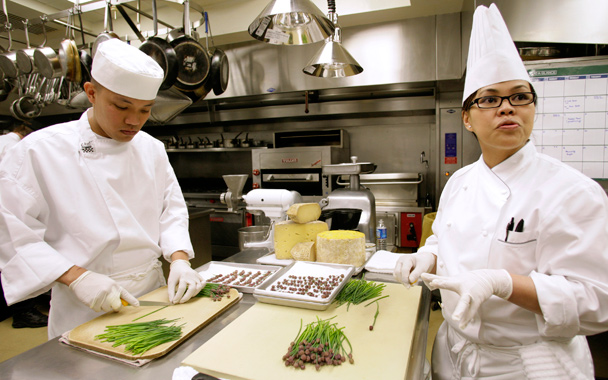The incoming President may be big on change, but not in the White House kitchen: Despite pressure from sustainable-food advocates, Obama has chosen to stick with the current White House chef, Cristeta Comerford, instead of hiring someone new. Last November, Alice Waters wrote a letter to Obama urging him to choose “a person with integrity and devotion to the ideals of environmentalism, health, and conservation,” sending a message to the country “that food choices matter.” She offered her help—and that of restaurateur Danny Meyer and Gourmet’s Ruth Reichl—in the search. The letter didn’t suggest any candidates for the job or specifically call for Comerford’s ouster, but the implication was that there needed to be a change because she didn’t necessarily fit the bill.
As it turns out, Comerford actually has some serious sustainable-food street cred. The previous White House chef, Walter Scheib, pointed out in a recent blog post—and in two even more recent, in-depth interviews with the blog Obama Foodorama—that Comerford was unfairly dismissed by the foodie set before they even knew her credentials. “Poor Cris,” he told the blog. “She’s been treated like so many pounds of chopped liver.” Scheib was the White House executive chef from 1994 to 2005, and Comerford worked as one of his assistants, becoming his favorite associate and then taking over for him when he left. As he says of their time working together, “Nearly all the products used was [sic] obtained from local growers and suppliers, in many cases directly from farm stands and growers. There also was a small garden on the roof of the White House where produce was grown for the families’ use.” During the Clinton administration, Scheib spent a lot of his time on the job “fulfilling Hillary Clinton’s mandate of bringing contemporary American cuisine and nutritionally responsible food to the White House,” he says. More surprisingly, Scheib’s account suggests that the recent administration may have been even more sustainability-minded in matters of the home kitchen: “Laura Bush to her credit and probably to your readers [sic] surprise was adamant that in ALL CASES if an organic product was available it was to be used in place of a non-organic product,” he wrote on his blog, adding that Comerford has always supported and continues to support these principles of sustainability.
Kudos to these chefs—and these former Presidents and first ladies—for making such forward-thinking choices (although given the complicated bidding process for government contracts, you have to wonder how many organic and sustainable food purveyors really win the right to supply the White House kitchen). But the fact that we’ve barely heard a peep about this commitment to good food until now is a problem; this lack of information only proves the point that Reichl and Waters have made that the White House chef’s post is an underutilized bully pulpit. One problem is that Comerford may not have a natural inclination to speak up—she’s reportedly more press-averse than the average White House chef, and the fact that her former boss is writing on her behalf now seems to prove the point. But the bigger issue is that it’s very difficult for a White House chef to speak publicly, as Scheib explained to Obama Foodorama. “You don’t talk to people on the outside while you’re on the inside. [...] I wanted to be [Comerford’s] surrogate, because she can’t speak for herself.” The chef can’t call her own press conferences, and in rare public appearances she is always accompanied by a member of the White House press office.
Fair enough—but perhaps this just shows that the position needs to be redefined. Granted, cabinet-level secretaries should be the primary spokespeople on agricultural and health issues, and we need people in those positions who support sustainable agriculture, better access to fresh food for low-income people, etc. But as anyone who’s ever heard of Alice Waters knows, the sustainable-food movement is so strong today largely because of outspoken, committed chefs—not bureaucrats—who have thrown the spotlight on local farmers and shown that sustainable, healthy food doesn’t just mean granola and tofu. While Scheib points out that it would be difficult for a “rock star” chef to move in to the White House (it would involve taking a big pay cut, for one thing), Comerford could overcome her aversion to the spotlight and borrow a page from the rock-star-chef playbook, continuing to push the envelope on sourcing and explaining her choices publicly wherever possible. For example, perhaps for the next White House Easter Egg Roll she could insist on using cage-free or free-range eggs. Public events like this, and other projects like the White House gingerbread house, get enough mainstream press coverage that any message of sustainability could reach legions of people who probably haven’t heard of Alice Waters.
Comerford may not be able to do a whole lot more from her position, but the first family certainly could. The last two families to live in the White House haven’t maximized the potential of this platform: Bill Clinton only really began speaking up about nutrition and his own diet after he was out of office, and Laura Bush was pretty mum about her commitment to organic food during her husband’s two terms in office (could that have something to with his apparent fondness for big agribusiness, I wonder?). Sure, they’re personal choices—and sure, keeping a few aspects of your life private is extremely important when you’re President or first lady. But as this country’s rates of obesity and diabetes continue to soar, as our waterways continue to be polluted by agricultural runoff and the safety of our food supply grows ever more uncertain, our leaders have a duty to address these issues. And if those leaders happen to be living examples of positive change in the food system, they should take every opportunity to tell people about it.




 Pinterest
Pinterest


